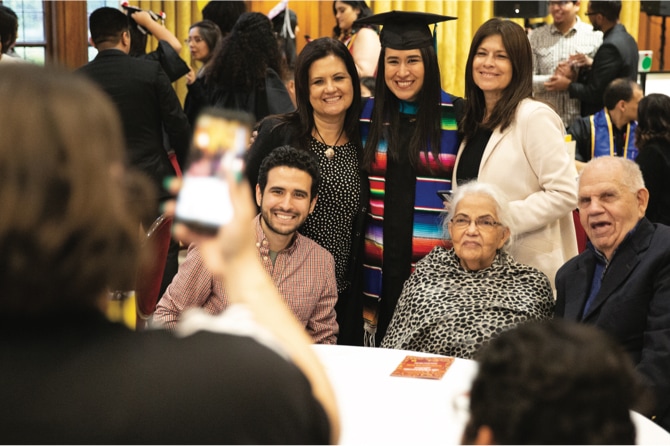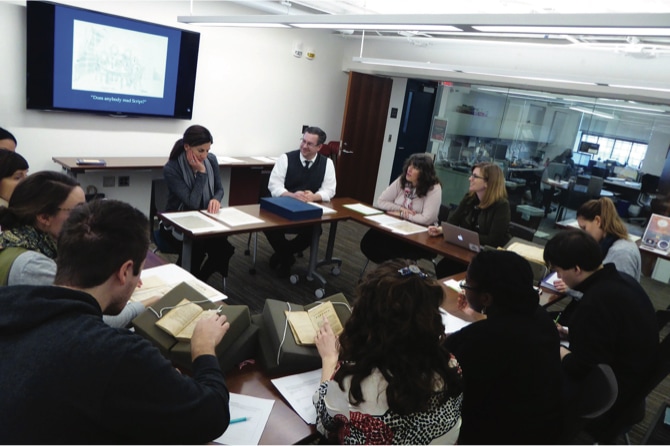Recruitment & Retention
The purpose of this strategic goal is to ensure that each and every school, college and unit provides students, staff and faculty with equitable access, entry and opportunities for learning, development and advancement. Before creating campuswide action items focused on recruitment and retention, DEI Planning Leads studied key indicators—including rates of completion, promotion, turnover and exit interview data—to assess differences in access, entry and development. While DEI-related recruitment and retention efforts across campus reflect the varied needs and goals of specific units and groups, the action items described below are designed to bolster and extend the work of all units by introducing effective programs and procedures aimed at recruiting, retaining and supporting a diverse campus community.
"I think we are just getting started - with how we can center diversity and inclusion in all aspects of how the university functions."
— Sydney Lopez, Medical Student
Engaged Learning and Co-curricular Support Initiatives
Student Life continued to strengthen the First Year Experience as described in its mission statement. Among our Year Four achievements, we expanded collaborations with academic partners, increased DEI programming in residence halls, and integrated support and education into existing curricular and co-curricular spaces. In alignment with our Thriving in the First Year framework, we strengthened opportunities for students to gain the skills necessary to establish an academic pattern of success, develop sustainable and healthy relationships, and engage and connect with a diverse learning community.
426 peer-led programs across 18 campus residences reached 6,069 participants
Faculty Allies Program

During the 2019–2020 academic year, the Faculty Allies Program succeeded in extending its impact despite COVID-19 restrictions. In addition to three in-person workshops focused on building community and creating a network of faculty DEI practitioners, the program hosted two virtual town halls where faculty discussed the effects of the pandemic on graduate students and diversity efforts, and brainstormed concrete, program-level action in the wake of the nationwide protests against systemic racism and police violence. Faculty Allies also awarded 37 diversity grants totaling nearly $335,000 to faculty and students across campus.
37 diversity grants totaling nearly $335,000 awarded to faculty and students
Faculty Leadership Development Fellowships
Over the past four years, the New Leadership Academy (NLA) core program has attracted 35 U-M participants, drawn from more than 130 national enrollees. The 2020 cohort includes five participants from the main campus and an additional six from Michigan Medicine. The New Leadership Program is now fully operational. As a result, U-M is well on the way to developing essential leadership at every level and across multiple career generations, with a shared vision of DEI goals in an historical context.
In the past 4 years, the New Leadership Academy (NLA) served 130 enrollees nationwide including 35 from U-M and Michigan Medicine
Faculty Recruitment and Retention Practice Initiative
This past year saw significant progress in four key areas. The ADVANCE Program’s STRIDE Committee held eight faculty workshops, setting a new attendance record of 317, for a total of 873 faculty in the last three years; the total jumps to over 1,000 when Michigan Medicine’s STRIDE committee attendance is added. Launch Committees provided support and guidance to new junior faculty as they began their careers at Michigan. With the addition of the 2019 Indicator Report, our interactive institutional data now include three dashboards related to tenure-track faculty. In addition, a new committee named Respect in Striving for Excellence (RISE) and modeled after STRIDE, began offering an interactive workshop series on climate to faculty leaders.
Over 1,000 faculty members have completed STRIDE training on faculty diversity recruitment in past 3 years
Faculty Training and Mentorship Resources
In January 2019, UM-Ann Arbor collaborated with the university’s Dearborn and Flint campuses in sponsoring a system-wide membership to the National Center for Faculty Development and Diversity (NCFDD). As a result of that effort, all faculty, postdoctoral scholars, and graduate students gained access to NCFDD’s full array of resources. Since then, membership numbers have grown steadily at all three campuses, with institutional members engaging in 14-day writing challenges, boot camp, and the NCFDD alumni network. End-of-program surveys consistently indicate high levels of satisfaction.
In past 4 years, 82 UM-Ann Arbor faculty members have participated in the Faculty Success Program (FSP), a 12-week program that supports balancing research, teaching and service
First-Generation Student Support
Year Four focused on outreach, leadership, and community programming. The Go Blue Guarantee and HAIL Scholarship Program increased the number of first-generation and low-income students on campus. In addition, the Office of Enrollment Management provided new data on first-generation graduate students, resulting in expanded opportunities for graduate student outreach. Adding to the momentum, student leaders organized a highly collaborative First-Gen Council to coordinate programming across campus.
Participation in First-Generation Gateway community programs increased 25% since previous year
Go Blue Guarantee
During Winter 2018, 1,687 current students were identified as being eligible for the Go Blue Guarantee (GBG) and, collectively, received over $11 million in institutional support for that term. In fall 2019, 1,612 current students were eligible and collectively received $19 million in institutional and federal support for that term. Overall,19 percent of all in-state undergraduates had family incomes below $65K. Of these students, 93 percent received institutional aid and 86 percent paid no tuition.
Nineteen percent of all in-state undergraduates had family incomes below $65K. Of these students, 93 percent received institutional aid and 86 percent paid no tuition
Graduate Student Pipeline Program

With support from the W. K. Kellogg Foundation, and co-sponsored by the National Forum for the Public Good in Higher Education and the National Center for Institutional Diversity (NCID), Rackham hosted a Minority Serving Institution disciplinary hub meeting. The session supported three U-M units in advancing their relationships and discipline-specific goals with 12 collaborators from eight different MSIs. With its working group and resource-sharing format, this convening served as an excellent foundation for future gatherings.
Rackham hosted a Minority Serving Institution (MSI) disciplinary hub meeting in which three U-M units in advanced relationships with 12 collaborators from eight different MSIs
HAIL Scholarship
Each year since its start in 2015, the HAIL Scholarship Program has contributed to an increase in applications from low-income students across Michigan, helping to increase the socioeconomic diversity of first-year classes. Overall, the program has proven to boost application, admission and matriculation rates, with the primary effect being a larger number of applications.
1,088 HAIL recipients have enrolled over past 4 years of the program, representing 73 Michigan counties and 330 high schools across the state
K-12 Outreach Hub
This past year, we continued to align the Center for Educational Outreach (CEO) mission and vision with our role as a hub that supports U-M’s commitment to educational outreach and academic excellence through collaborative programs that inform, engage and inspire a diverse community of scholars. As our primary focus, we prioritized the Center’s work and made significant progress in advancing four key areas: (1) supporting communities of practice, (2) developing infrastructure and tools to support outreach, (3) building capacity and consulting and (4) delivery of direct service to schools and students. This also includes responding to the COVID-19 needs of our community partners and cross-campus collaborations.
CEO hosted the 11th Annual Pre-College and Youth Outreach Conference in November, 2019 attended by over 250 outreach professionals from across the State
Native Student Initiative
As in years past, Office of Enrollment Management (OEM) was proactive in sending recruitment materials to all 2019 College Horizons participants. We also participated in the virtual 2020 College Horizons program, providing financial support as well as a faculty member to assist with programming. In addition, we are supporting the Traditional Lacrosse Game—to include virtual activities co-sponsored by U-M, Michigan State University, UD-Mercy, and Albion College–with program funding and a virtual campus tour. In year five and beyond, OEM will continue to work broadly with NASA and other U-M student groups, and will include them in our fall Slice of Life program for prospective students as well as our August Maize and You application workshop.
U-M participated in the virtual 2020 College Horizons program, providing financial support and a faculty presentation on college admissions
Staff Recruitment Practices Initiative
During Year Four, University Human Resources (UHR) focused its efforts on strengthening current initiatives, adding strategic tools and resources, advancing best practices, and reinforcing vital infrastructure. Despite interruptions and programmatic pauses resulting from COVID-19, progress was made in building diverse, qualified candidate pools, increasing U-M’s visibility in key job markets, and supporting equitable experiences for candidates.
Launched revamped Resources for Hiring Units webpage featuring protocols for mitigating bias new job posting platform to support inclusive, candidate-friendly postings
SuccessConnects
During the 2019-2020 academic year, 636 students registered for SuccessConnects—an 11 percent increase over the prior year. These scholars participated in 1,800 one-on-one coaching sessions as well as a variety of workshops and social/community events aimed at supporting their academic, personal and social success. As a result of the continuing increase in scholar enrollment and lessons learned over the past four years, the program not only grew in scope and impact but was also instrumental in helping students successfully navigate the COVID-19 pandemic.
SuccessConnects pivoted quickly to support students remotely the wake of COVID-19 through consistent communications, support, follow-up, and resource sharing
Urban School Community Based Recruitment Initiative
With regional recruiters in place, we focused on building intentional partnerships with community-based college access organizations and forging new connections with community partners in underserved areas nationwide. In all, 36 of the 63 students who applied to our first cohort in Fall 2019 were admitted. Of the 11 who matriculated, over half identify as members of underrepresented minority groups and nearly all will be the first in their families to graduate from college.
In 2019-2020, efforts focused on building and sustaining intentional partnerships with college access organizations and advocates in highly underserved urban areas
Wolverine Pathways

Now in its fourth year of programming, Wolverine Pathways (WP) continues to link the power of U-M’s academic and research enterprise, the resources and innovations of community partners, and the instructional expertise of secondary teachers to support scholars’ academic success, college admission, and career exploration. The program enrolled 649 scholars at the start of the 2019-2020 academic year and has served a total of 1,147 scholars since its inception: 445 from Detroit, 416 from Southfield and 286 from Ypsilanti. WP also graduated its third class, with all 89 matriculating scholars being admitted to selective colleges nationwide.
The program enrolled 649 scholars at the start of the 2019-2020 academic year and has served a total of 1,147 scholars since its inception